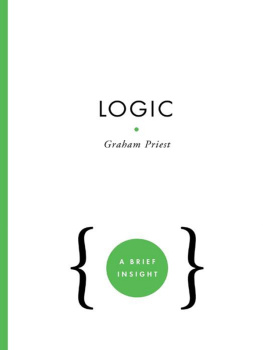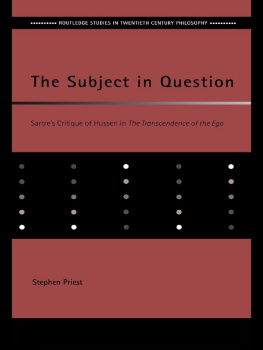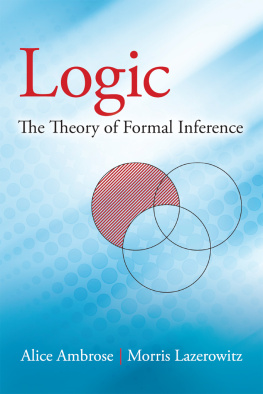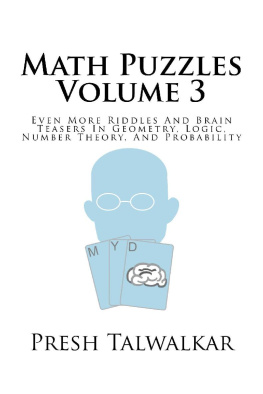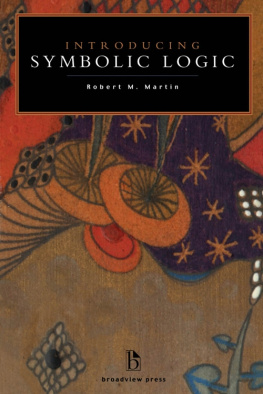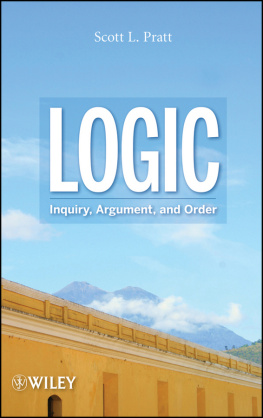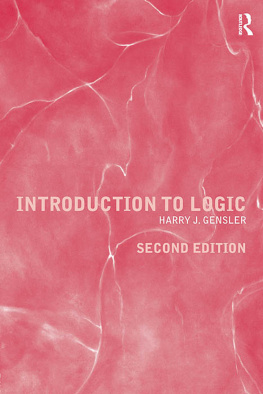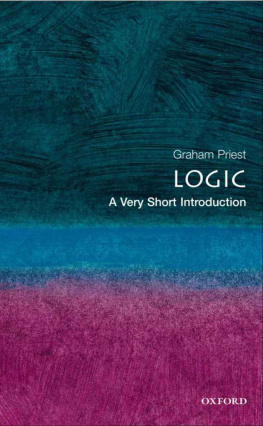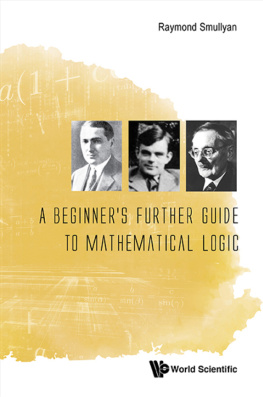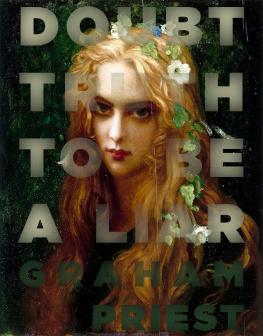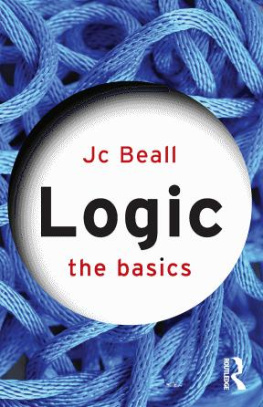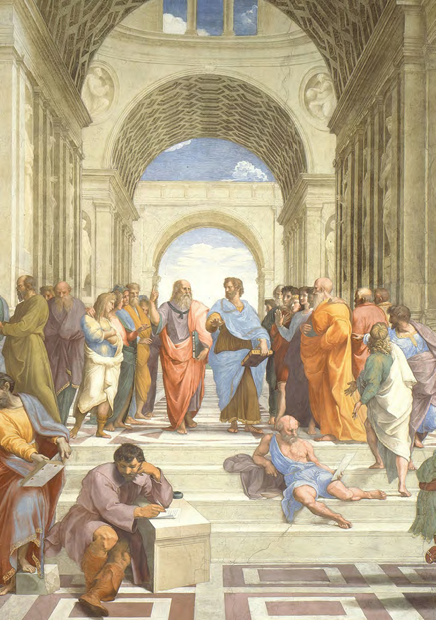
LOGIC

Graham Priest


New York / London
www.sterlingpublishing.com
STERLING and the distinctive Sterling logo are registered trademarks of
Sterling Publishing Co., Inc.
Library of Congress Cataloging-in-Publication Data Available
10 9 8 7 6 5 4 3 2 1
Published by Sterling Publishing Co., Inc.
387 Park Avenue South, New York, NY 10016
Published by arrangement with Oxford University Press, Inc.
2000 by Graham Priest
Illustrated edition published in 2010 by Sterling Publishing Co., Inc.
Additional text 2010 Sterling Publishing Co., Inc.
Distributed in Canada by Sterling Publishing
c/o Canadian Manda Group, 165 Dufferin Street
Toronto, Ontario, Canada M6K 3H6
Book design: The DesignWorks Group
Please see picture credits on page 181 for image copyright information.
Printed in China
All rights reserved
Sterling ISBN 978-1-4027-6896-5
For information about custom editions, special sales, premium and
corporate purchases, please contact Sterling Special Sales
Department at 800-805-5489 or .
Frontispiece: The origin of logic in Western thought is to be found in the work of Aristotle, here seen with Plato (in red robes) in Raphaels c. 1510 masterpiece, The School of Athens.
CONTENTS
PREFACE
LOGIC IS ONE OF THE MOST ancient intellectual disciplines, and one of the most modern. Its beginnings go back to the fourth century BCE . The only older disciplines are philosophy and mathematics, with both of which it has always been intimately connected. It was revolutionized around the turn of the twentieth century, by the application of new mathematical techniques, and in the last half-century it has found radically new and important roles in computation and information processing. It is thus a subject that is central to much human thought and endeavor.
This book is an introduction to logic, as contemporary logicians now understand the subject. It does not attempt to be a textbook, however. There are numerous such books currently available. The point of this one is to explore the roots of logic, which sink deep into philosophy. Some formal logic will be explained along the way.
In each of the main chapters, I start by taking up some particular philosophical problem or logical puzzle. I then explain one approach to it. Often this is a fairly standard one; but in some of the areas there is no standard answer: logicians still disagree. In such cases, I have just chosen one that is interesting. Nearly all the approaches, whether standard or not, may be challenged. I finish each chapter with some problems for the approach that I have explained. Sometimes these problems are standard; sometimes they are not. Sometimes they may have easy answers; sometimes they may not. The aim is to challenge you to figure out what you make of the matter.
Modern logic is a highly mathematical subject. I have tried to write the material in such a way as to avoid nearly all mathematics. The most that is required is a little high-school algebra in the last few chapters. It is true that you will need the determination to master some symbolism that may be new to you; but this is a lot less than is required to have a basic grasp of any new language. And the perspicuity that the symbolism gives to difficult questions makes any trouble one may have in mastering it well worth it. One warning, though: reading a book on logic or philosophy is not like reading a novel. There will be times when you will have to read slowly and carefully. Sometimes you may have to stop and think about things; and you should be prepared to go back and reread a paragraph if necessary.
The final chapter of the book is on the development of logic. In this, I have tried to put some of the issues that the book deals with in an historical perspective, to show that logic is a living subject, which has always evolved, and which will continue to do so. The chapter also contains suggestions for further reading.
There are two appendices. The first contains a glossary of terms and symbols. You may consult this if you forget the meaning of a word or symbol. The second appendix contains a question relevant to each chapter, with which you can test your understanding of its main ideas.
The book goes for breadth rather than depth. It would be easy to write a book on the topic of every single chapterindeed, many such books have been written. And even so, there are very many important issues in logic that I have not even touched on here. But if you hang in there until the end of the book, you will have a pretty good idea of the fundamentals of modern logic, and why people find it worth thinking about the subject.
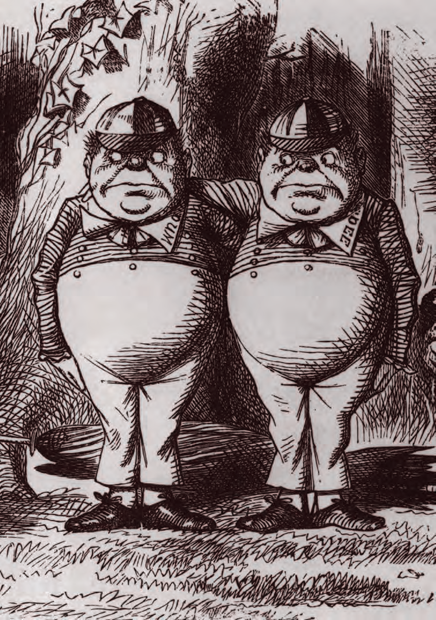
Tweedledum and Tweedledee debate the finer points of logic in John Tenniels illustration for Carrolls 1871 sequel, Through the Looking-Glass, and What Alice Found There. Author Charles Dodgson (183298), pseudonym Lewis Carroll, was a skilled logician and mathematician who threaded paradoxes and logical jokes through his work.

MOST PEOPLE LIKE TO THINK of themselves as logical. Telling someone You are not being logical is normally a form of criticism. To be illogical is to be confused, muddled, irrational. But what is logic? In Lewis Carrolls Through the Looking-Glass, Alice meets the logic-chopping pair Tweedledum and Tweedledee. When Alice is lost for words, they go onto the attack:
I know what you are thinking about, said Tweedledum: but it isnt so, nohow.
Contrariwise, continued Tweedledee, if it was so, it might be; and if it were so, it would be: but as it isnt, it aint. Thats logic.
What Tweedledee is doingat least, in Carrolls parodyis reasoning. And that, as he says, is what logic is about.
We all reason. We try to figure out what is so, reasoning on the basis of what we already know. We try to persuade others that something is so by giving them reasons. Logic is the study of what counts as a good reason for what, and why. You have to understand this claim in a certain way, though. Here are two bits of reasoninglogicians call them :
Rome is the capital of Italy, and this plane lands in Rome; so the plane lands in Italy.
Moscow is the capital of the US; so you cant go to Moscow without going to the US.
In each case, the claims before the sologicians call them . So the central aim of logic is to understand validity.
You might think this a rather dull taskan intellectual exercise with somewhat less appeal than solving crossword puzzles. But it turns out that this is not only a very hard matter; it is one that cannot be divorced from a number of important (and sometimes profound) philosophical questions. We will see some of these as we go along. For the moment, let us get a few more of the basic facts about validity straight.

